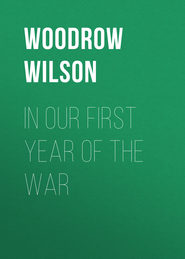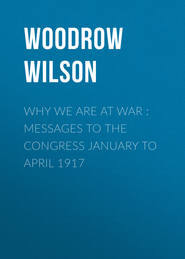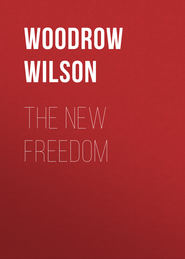По всем вопросам обращайтесь на: info@litportal.ru
(©) 2003-2024.
✖
State of the Union Addresses
Автор
Год написания книги
2019
Настройки чтения
Размер шрифта
Высота строк
Поля
To what sources, then, shall we turn? This is so peculiarly a question which the gentlemen of the House of Representatives are expected under the Constitution to propose an answer to that you will hardly expect me to do more than discuss it in very general terms. We should be following an almost universal example of modern governments if we were to draw the greater part or even the whole of the revenues we need from the income taxes. By somewhat lowering the present limits of exemption and the figure at which the surtax shall begin to be imposed, and by increasing, step by step throughout the present graduation, the surtax itself, the income taxes as at present apportioned would yield sums sufficient to balance the books of the Treasury at the end of the fiscal year 1917 without anywhere making the burden unreasonably or oppressively heavy. The precise reckonings are fully and accurately set out in the report of the Secretary of the Treasury which will be immediately laid before you.
And there are many additional sources of revenue which can justly be resorted to without hampering the industries of the country or putting any too great charge upon individual expenditure. A tax of one cent per gallon on gasoline and naphtha would yield, at the present estimated production, $10,000,000; a tax of fifty cents per horse power on automobiles and internal explosion engines, $15,000,000; a stamp tax on bank cheques, probably $18,000,000; a tax of twenty-five cents per ton on pig iron, $10,000,000; a tax of twenty-five cents per ton on fabricated iron and steel, probably $10,000,000. In a country of great industries like this it ought to be easy to distribute the burdens of taxation without making them anywhere bear too heavily or too exclusively upon any one set of persons or undertakings. What is clear is, that the industry of this generation should pay the bills of this generation.
I have spoken to you to-day, Gentlemen, upon a single theme, the thorough preparation of the nation to care for its own security and to make sure of entire freedom to play the impartial role in this hemisphere and in the world which we all believe to have been providentially assigned to it. I have had in my mind no thought of any immediate or particular danger arising out of our relations with other nations. We are at peace with all the nations of the world, and there is reason to hope that no question in controversy between this and other Governments will lead to any serious breach of amicable relations, grave as some differences of attitude and policy have been land may yet turn out to be. I am sorry to say that the gravest threats against our national peace and safety have been uttered within our own borders. There are citizens of the United States, I blush to admit, born under other flags but welcomed under our generous naturalization laws to the full freedom and opportunity of America, who have poured the poison of disloyalty into the very arteries of our national life; who have sought to bring the authority and good name of our Government into contempt, to destroy our industries wherever they thought it effective for their vindictive purposes to strike at them, and to debase our politics to the uses of foreign intrigue. Their number is not great as compared with the whole number of those sturdy hosts by which our nation has been enriched in recent generations out of virile foreign stock; but it is great enough to have brought deep disgrace upon us and to have made it necessary that we should promptly make use of processes of law by which we may be purged of their corrupt distempers. America never witnessed anything like this before. It never dreamed it possible that men sworn into its own citizenship, men drawn out of great free stocks such as supplied some of the best and strongest elements of that little, but how heroic, nation that in a high day of old staked its very life to free itself from every entanglement that had darkened the fortunes of the older nations and set up a new standard here, that men of such origins and such free choices of allegiance would ever turn in malign reaction against the Government and people who had welcomed and nurtured them and seek to make this proud country once more a hotbed of European passion. A little while ago such a thing would have seemed incredible. Because it was incredible we made no preparation for it. We would have been almost ashamed to prepare for it, as if we were suspicious of ourselves, our own comrades and neighbors! But the ugly and incredible thing has actually come about and we are without adequate federal laws to deal with it. I urge you to enact such laws at the earliest possible moment and feel that in doing so I am urging you to do nothing less than save the honor and self-respect of the nation. Such creatures of passion, disloyalty, and anarchy must be crushed out. They are not many, but they are infinitely malignant, and the hand of our power should close over them at once. They have formed plots to destroy property, they have entered into conspiracies against the neutrality of the Government, they have sought to pry into every confidential transaction of the Government in order to serve interests alien to our own. It is possible to deal with these things very effectually. I need not suggest the terms in which they may be dealt with.
I wish that it could be said that only a few men, misled by mistaken sentiments of allegiance to the governments under which they were born, had been guilty of disturbing the self-possession and misrepresenting the temper and principles of the country during these days of terrible war, when it would seem that every man who was truly an American would instinctively make it his duty and his pride to keep the scales of judgment even and prove himself a partisan of no nation but his own. But it cannot. There are some men among us, and many resident abroad who, though born and bred in the United States and calling themselves Americans, have so forgotten themselves and their honor as citizens as to put their passionate sympathy with one or the other side in the great European conflict above their regard for the peace and dignity of the United States. They also preach and practice disloyalty. No laws, I suppose, can reach corruptions of the mind and heart; but I should not speak of others without also speaking of these and expressing the even deeper humiliation and scorn which every self-possessed and thoughtfully patriotic American must feel when he thinks of them and of the discredit they are daily bringing upon us.
While we speak of the preparation of the nation to make sure of her security and her effective power we must not fall into the patent error of supposing that her real strength comes from armaments and mere safeguards of written law. It comes, of course, from her people, their energy, their success in their undertakings, their free opportunity to use the natural resources of our great home land and of the lands outside our continental borders which look to us for protection, for encouragement, and for assistance in their development; from the organization and freedom and vitality of our economic life. The domestic questions which engaged the attention of the last Congress are more vital to the nation in this its time of test than at any other time. We cannot adequately make ready for any trial of our strength unless we wisely and promptly direct the force of our laws into these all-important fields of domestic action. A matter which it seems to me we should have very much at heart is the creation of the right instrumentalities by which to mobilize our economic resources in any time of national necessity. I take it for granted that I do not need your authority to call into systematic consultation with the directing officers of the army and navy men of recognized leadership and ability from among our citizens who are thoroughly familiar, for example, with the transportation facilities of the country and therefore competent to advise how they may be coordinated when the need arises, those who can suggest the best way in which to bring about prompt cooperation among the manufacturers of the country, should it be necessary, and those who could assist to bring the technical skill of the country to the aid of the Government in the solution of particular problems of defense. I only hope that if I should find it feasible to constitute such an advisory body the Congress would be willing to vote the small sum of money that would be needed to defray the expenses that would probably be necessary to give it the clerical and administrative Machinery with which to do serviceable work.
What is more important is, that the industries and resources of the country should be available and ready for mobilization. It is the more imperatively necessary, therefore, that we should promptly devise means for doing what we have not yet done: that we should give intelligent federal aid and stimulation to industrial and vocational education, as we have long done in the large field of our agricultural industry; that, at the same time that we safeguard and conserve the natural resources of the country we should put them at the disposal of those who will use them promptly and intelligently, as was sought to be done in the admirable bills submitted to the last Congress from its committees on the public lands, bills which I earnestly recommend in principle to your consideration; that we should put into early operation some provision for rural credits which will add to the extensive borrowing facilities already afforded the farmer by the Reserve Bank Act, adequate instrumentalities by which long credits may be obtained on land mortgages; and that we should study more carefully than they have hitherto been studied the right adaptation of our economic arrangements to changing conditions.
Many conditions about which we I-lave repeatedly legislated are being altered from decade to decade, it is evident, under our very eyes, and are likely to change even more rapidly and more radically in the days immediately ahead of us, when peace has returned to the world and the nations of Europe once more take up their tasks of commerce and industry with the energy of those who must bestir themselves to build anew. Just what these changes will be no one can certainly foresee or confidently predict. There are no calculable, because no stable, elements in the problem. The most we can do is to make certain that we have the necessary instrumentalities of information constantly at our service so that we may be sure that we know exactly what we are dealing with when we come to act, if it should be necessary to act at all. We must first certainly know what it is that we are seeking to adapt ourselves to. I may ask the privilege of addressing you more at length on this important matter a little later in your session.
In the meantime may I make this suggestion? The transportation problem is an exceedingly serious and pressing one in this country. There has from time to time of late been reason to fear that our railroads would not much longer be able to cope with it successfully, as at present equipped and coordinated I suggest that it would be wise to provide for a commission of inquiry to ascertain by a thorough canvass of the whole question whether our laws as at present framed and administered are as serviceable as they might be in the solution of the problem. It is obviously a problem that lies at the very foundation of our efficiency as a people. Such an inquiry ought to draw out every circumstance and opinion worth considering and we need to know all sides of the matter if we mean to do anything in the field of federal legislation.
No one, I am sure, would wish to take any backward step. The regulation of the railways of the country by federal commission has had admirable results and has fully justified the hopes and expectations of those by whom the policy of regulation was originally proposed. The question is not what should we undo? It is, whether there is anything else we can do that would supply us with effective means, in the very process of regulation, for bettering the conditions under which the railroads are operated and for making them more useful servants of the country as a whole. It seems to me that it might be the part of wisdom, therefore, before further legislation in this field is attempted, to look at the whole problem of coordination and efficiency in the full light of a fresh assessment of circumstance and opinion, as a guide to dealing with the several parts of it.
For what we are seeking now, what in my mind is the single thought of this message, is national efficiency and security. We serve a great nation. We should serve it in the spirit of its peculiar genius. It is the genius of common men for self-government, industry, justice, liberty and peace. We should see to it that it lacks no instrument, no facility or vigor of law, to make it sufficient to play its part with energy, safety, and assured success. In this we are no partisans but heralds and prophets of a new age.
***
State of the Union Address
Woodrow Wilson
December 5, 1916
GENTLEMEN OF THE CONGRESS:
In fulfilling at this time the duty laid upon me by the Constitution of communicating to you from time to time information of the state of the Union and recommending to your consideration such legislative measures as may be judged necessary and expedient, I shall continue the practice, which I hope has been acceptable to you, of leaving to the reports of the several heads of the executive departments the elaboration of the detailed needs of the public service and confine myself to those matters of more general public policy with which it seems necessary and feasible to deal at the present session of the Congress.
I realize the limitations of time under which you will necessarily act at this session and shall make my suggestions as few as possible; but there were some things left undone at the last session which there will now be time to complete and which it seems necessary in the interest of the public to do at once.
In the first place, it seems to me imperatively necessary that the earliest possible consideration and action should be accorded the remaining measures of the program of settlement and regulation which I had occasion to recommend to you at the close of your last session in view of the public dangers disclosed by the unaccommodated difficulties which then existed, and which still unhappily continue to exist, between the railroads of the country and their locomotive engineers, conductors and trainmen.
I then recommended:
First, immediate provision for the enlargement and administrative reorganization of the Interstate Commerce Commission along the lines embodied in the bill recently passed by the House of Representatives and now awaiting action by the Senate; in order that the Commission may be enabled to deal with the many great and various duties now devolving upon it with a promptness and thoroughness which are, with its present constitution and means of action, practically impossible.
Second, the establishment of an eight-hour day as the legal basis alike of work and wages in the employment of all railway employes who are actually engaged in the work of operating trains in interstate transportation.
Third, the authorization of the appointment by the President of a small body of men to observe actual results in experience of the adoption of the eight-hour day in railway transportation alike for the men and for the railroads.
Fourth, explicit approval by the Congress of the consideration by the Interstate Commerce Commission of an increase of freight rates to meet such additional expenditures by the railroads as may have been rendered necessary by the adoption of the eight-hour day and which have not been offset by administrative readjustments and economies, should the facts disclosed justify the increase.
Fifth, an amendment of the existing Federal statute which provides for the mediation, conciliation and arbitration of such controversies as the present by adding to it a provision that, in case the methods of accommodation now provided for should fail, a full public investigation of the merits of every such dispute shall be instituted and completed before a strike or lockout may lawfully be attempted.
And, sixth, the lodgment in the hands of the Executive of the power, in case of military necessity, to take control of such portions and such rolling stock of the railways of the country as may be required for military use and to operate them for military purposes, with authority to draft into the military service of the United States such train crews and administrative officials as the circumstances require for their safe and efficient use.
The second and third of these recommendations the Congress immediately acted on: it established the eight-hour day as the legal basis of work and wages in train service and it authorized the appointment of a commission to observe and report upon the practical results, deeming these the measures most immediately needed; but it postponed action upon the other suggestions until an opportunity should be offered for a more deliberate consideration of them.
The fourth recommendation I do not deem it necessary to renew. The power of the Interstate Commerce Commission to grant an increase of rates on the ground referred to is indisputably clear and a recommendation by the Congress with regard to such a matter might seem to draw in question the scope of the commission's authority or its inclination to do justice when there is no reason to doubt either.
The other suggestions-the increase in the Interstate Commerce Commission's membership and in its facilities for performing its manifold duties; the provision for full public investigation and assessment of industrial disputes, and the grant to the Executive of the power to control and operate the railways when necessary in time of war or other like public necessity-I now very earnestly renew.
The necessity for such legislation is manifest and pressing. Those who have entrusted us with the responsibility and duty of serving and safeguarding them in such matters would find it hard, I believe, to excuse a failure to act upon these grave matters or any unnecessary postponement of action upon them.
Not only does the Interstate Commerce Commission now find it practically impossible, with its present membership and organization, to perform its great functions promptly and thoroughly, but it is not unlikely that it may presently be found advisable to add to its duties still others equally heavy and exacting. It must first be perfected as an administrative instrument.
The country cannot and should not consent to remain any longer exposed to profound industrial disturbances for lack of additional means of arbitration and conciliation which the Congress can easily and promptly supply.
And all will agree that there must be no doubt as to the power of the Executive to make immediate and uninterrupted use of the railroads for the concentration of the military forces of the nation wherever they are needed and whenever they are needed.
This is a program of regulation, prevention and administrative efficiency which argues its own case in the mere statement of it. With regard to one of its items, the increase in the efficiency of the Interstate Commerce Commission, the House of Representatives has already acted; its action needs only the concurrence of the Senate.
I would hesitate to recommend, and I dare say the Congress would hesitate to act upon the suggestion should I make it, that any man in any I occupation should be obliged by law to continue in an employment which he desired to leave.
To pass a law which forbade or prevented the individual workman to leave his work before receiving the approval of society in doing so would be to adopt a new principle into our jurisprudence, which I take it for granted we are not prepared to introduce.
But the proposal that the operation of the railways of the country shall not be stopped or interrupted by the concerted action of organized bodies of men until a public investigation shall have been instituted, which shall make the whole question at issue plain for the judgment of the opinion of the nation, is not to propose any such principle.
It is based upon the very different principle that the concerted action of powerful bodies of men shall not be permitted to stop the industrial processes of the nation, at any rate before the nation shall have had an opportunity to acquaint itself with the merits of the case as between employe and employer, time to form its opinion upon an impartial statement of the merits, and opportunity to consider all practicable means of conciliation or arbitration.
I can see nothing in that proposition but the justifiable safeguarding by society of the necessary processes of its very life. There is nothing arbitrary or unjust in it unless it be arbitrarily and unjustly done. It can and should be done with a full and scrupulous regard for the interests and liberties of all concerned as well as for the permanent interests of society itself.
Three matters of capital importance await the action of the Senate which have already been acted upon by the House of Representatives; the bill which seeks to extend greater freedom of combination to those engaged in promoting the foreign commerce of the country than is now thought by some to be legal under the terms of the laws against monopoly; the bill amending the present organic law of Porto Rico; and the bill proposing a more thorough and systematic regulation of the expenditure of money in elections, commonly called the Corrupt Practices Act.
I need not labor my advice that these measures be enacted into law. Their urgency lies in the manifest circumstances which render their adoption at this time not only opportune but necessary. Even delay would seriously jeopard the interests of the country and of the Government.
Immediate passage of the bill to regulate the expenditure of money in elections may seem to be less necessary than the immediate enactment of the other measures to which I refer, because at least two years will elapse before another election in which Federal offices are to be filled; but it would greatly relieve the public mind if this important matter were dealt with while the circumstances and the dangers to the public morals of the present method of obtaining and spending campaign funds stand clear under recent observation, and the methods of expenditure can be frankly studied in the light of present experience; and a delay would have the further very serious disadvantage of postponing action until another election was at hand and some special object connected with it might be thought to be in the mind of those who urged it. Action can be taken now with facts for guidance and without suspicion of partisan purpose.
I shall not argue at length the desirability of giving a freer hand in the matter of combined and concerted effort to those who shall undertake the essential enterprise of building up our export trade. That enterprise will presently, will immediately assume, has indeed already assumed a magnitude unprecedented in our experience. We have not the necessary instrumentalities for its prosecution; it is deemed to be doubtful whether they could be created upon an adequate scale under our present laws.
We should clear away all legal obstacles and create a basis of undoubted law for it which will give freedom without permitting unregulated license. The thing must be done now, because the opportunity is here and may escape us if we hesitate or delay.
The argument for the proposed amendments of the organic law of Porto Rico is brief and conclusive. The present laws governing the island and regulating the rights and privileges of its people are not just. We have created expectations of extended privilege which we have not satisfied. There is uneasiness among the people of the island and even a suspicious doubt with regard to our intentions concerning them which the adoption of the pending measure would happily remove. We do not doubt what we wish to do in any essential particular. We ought to do it at once.
At the last session of the Congress a bill was passed by the Senate which provides for the promotion of vocational and industrial education, which is of vital importance to the whole country because it concerns a matter, too long neglected, upon which the thorough industrial preparation of the country for the critical years of economic development immediately ahead of us in very large measure depends.
May I not urge its early and favorable consideration by the House of Representatives and its early enactment into law? It contains plans which affect all interests and all parts of the country, and I am sure that there is no legislation now pending before the Congress whose passage the country awaits with more thoughtful approval or greater impatience to see a great and admirable thing set in the way of being done.
There are other matters already advanced to the stage of conference between the two houses of which it is not necessary that I should speak. Some practicable basis of agreement concerning them will no doubt be found an action taken upon them.
Inasmuch as this is, gentlemen, probably the last occasion I shall have to address the Sixty-fourth Congress, I hope that you will permit me to say with what genuine pleasure and satisfaction I have co-operated with you in the many measures of constructive policy with which you have enriched the legislative annals of the country. It has been a privilege to labor in such company. I take the liberty of congratulating you upon the completion of a record of rare serviceableness and distinction.
***
State of the Union Address











